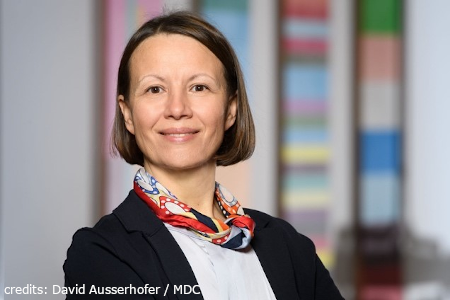Dr. Oksana Seumenicht graduated in Nuclear Physics with honors from the Taras Shevchenko National University of Kyiv, Ukraine (1992). She then carried out her PhD research in Radiobiology at the Institute of Cell Biology and Genetic Engineering, National Academy of Sciences of Ukraine (Kyiv) and gained a PhD in Biology (1995). Oksana Seumenicht worked as a postdoctoral researcher in Ukraine, Denmark, Germany and the UK (including the University of Oxford and UCL), supported by a number of competitive personal fellowships, e.g. from the DAAD (1998-1999), the Royal Society of the Great Britain (1999-2000) and the Wellcome Trust, UK (2000-2002). In 2005 Oksana Seumenicht joined the Research & Commercial Division of Cardiff University (UK) as Research Development Officer. She moved to Berlin in 2006 and was appointed as the first PhD Coordinator of the MDC-HU Berlin International PhD Program “Molecular Cell Biology”. Subsequently she raised funds for and built up the MDC Graduate School, which she managed (2007-2009). In 2010-2018 she worked as the MDC’s International Relations Officer, and since 2018 she works at the Department for Strategic Cooperations and Research Funding, MDC. In 2015 Oksana Seumenicht co-founded the UKRainian Academic International NETwork (UKRAINET) and German-Ukrainian Academic Society (DUAG) in 2016, and she has been serving as DUAG’s Managing Director since. Oksana Seumenicht was born in Kirovograd region, Ukraine, is married and has three children.
Research Development Manager, Department for Research Funding
Max Delbrück Centrum for Molecular Medicine in the Helmholtz Association (MDC)
Managing Director, German-Ukrainian Academic Society
Presenting about:
Stand with Ukraine: How can we best support Ukraine now and lay the ground for its rebuilding after the war
Abstract: From the very first days of the russian war against Ukraine and the West an overwhelming majority of leading researchers, research managers and government officials, as well as research funding and research performing organizations, alliances of HEIs and research institutes and responsible ministries all over the world strongly condemned russian aggression. They expressed their unequivocal solidarity with the people of Ukraine, offered support for the Ukrainian academics fleeing the war and, in many cases, froze institutional collaboration and stopped joint projects with researchers from the russian federation. First and foremost, the immediate humanitarian needs of Ukrainian academics displaced as the result of the russian war against Ukraine have been addressed. At the same time, the urgent needs of the majority of researchers, those remaining in Ukraine and continuing their work, as well as that of the universities and research organizations, have been underappreciated. In this contribution, schemes for non-residential support, as well as more forward-looking "structural" collaborative approaches aimed at rebuilding Ukrainian science after the war will be discussed.

